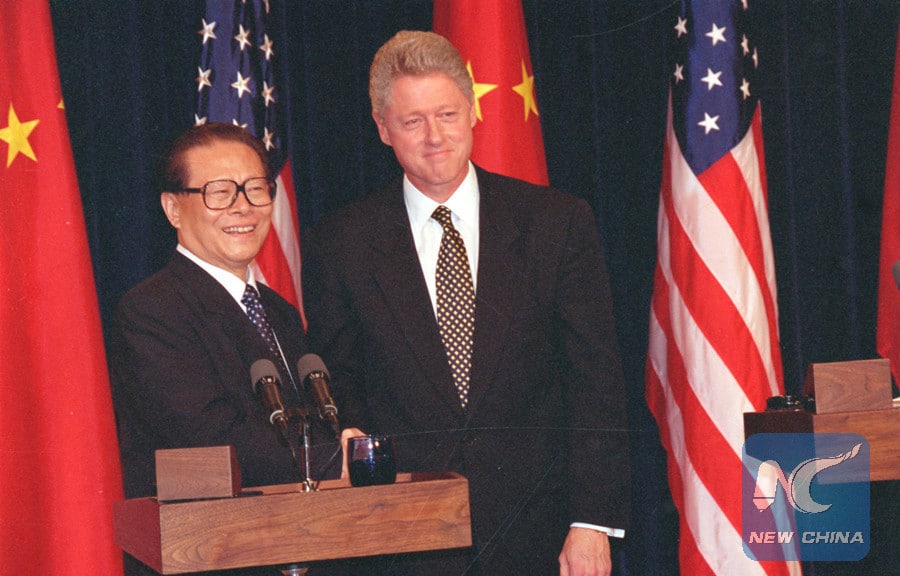TOM PLATE WRITES — You have to wonder how well (if at all) General Secretary Xi Jinping and President Joseph Biden are going to get along.
Imagine such a splendid scene as this! With TV cameras broadcasting live around the world you see the leader of the Peoples Republic of China in civilized conversation with the leader of the U.S.– and not ignoring differences, questioning mutual assumptions, making fair points with evident respect and, if you can believe, with intelligence. No Commie this or Capitalist Roader that, but a diligent discourse between prime representatives of giant economies and nuclear arsenals.
Almost impossible to imagine, no?
Aha! Not many years ago, something like this happened in Beijing. At a June 1998 press conference, after a two-hour closed-door summit, Chinese leader Jiang Zemin and U.S. President Bill Clinton agreed to go at it for all the world to see. On Jiang’s personal orders, and against aides’ counsel, China’s TV cameras broadcast the back-and forth between the two leaders brash enough to open a global window for all. From Clinton, the Chinese audience heard criticism of the 1989 Tiananmen crackdown and of the Tibet controversy, not common topics of open conversation on the mainland. From Jiang came a firm and articulate contextualization of the decision from the perspective of China’s stability.
Long after this, Clinton was to explain that that “Jiang had grown more confident in his ability to deal with such issues in public and he trusted me to disagree in a respectful way….” Alas, Clinton, well into his second term, had waited too long to ever get to visit China again as president and capitalize on the connection, but prodigious bilateral work by others in his administration, especially U.S. trade representative Charlene Barshevsky, led to China’s entry into the World Trade Organization, nailing down a better standard for the overall bilateral relationship that is but a faint memory today.
Patient, alert diplomacy, adult give-and-take, and a dash of trust from both sides won’t cure all the bilateral’s ills but it can ease them and perhaps prevent new ones from threatening. Don’t forget just the year before, in 1997, Beijing recouped Hong Kong from the sullen British, otherwise a great U.S. ally notwithstanding the lingering colonialist attitude. Simply put, Clinton and Jiang kept the relationship going because a lot more than Hong Kong, important as it was, depended on it. Can you imagine that kind of informal interaction today?
Beijing’s ‘increasingly assertive’ grumpiness is hardly the only hurdle. On the contrary, the American political establishment seems to under-value Sino-U.S. diplomacy as some sort of sophomoric delusion. Even Barack Obama, in Presidential office 10 years later, was to express to aides a paucity of hope for the Sino-US relationship. But the standards of success had been yanked absurdly high. In Washington and New York, especially, you’d hear moaning that the ‘being nice-to Beijing’ policy wasn’t yielding results. It’s as if there was a near-unanimous expectation that economic ‘concessions’ to China (i.e., negotiating as respectfully with it as with any other sovereign nation while maturely accepting that if you got half of what you wanted that was in fact an okay deal) would automatically kick open the door to acceptance of Western points of view on contentious value issues that have been with China forever.
It is my belief that anyone who truly believed this nonsense was either hopelessly naïve or conscious concocting a formula for a self-fulfilling failure of diplomacy. By contrast, the Clinton policy of transactional intensity and ideological modulation arose from common sense (why war?) and was inspired by textbook capitalist greed (why not sell ‘em as much as you can?). Deeply pious humanitarianism was nowhere near the deal, though burning with intensity in the hearts and minds of Western human-rights elites.
It’s too bad that America — and perhaps China as well – failed to realize what they had in Jiang and Clinton: They were by nature diplomats, and it always takes two skilled ones of such to disentangle a bilateral mess. Jiang — a disciple of the Deng Xiaoping school of trial-and-error economic pragmatism, though always subject to Party oversight – accepted that China had to escape glaring mistakes of the recent past and not bluster around the neighborhood like some Mongolian marauder. Alas, ever since Jiang’s departure in 2002, Chinese modalities have gotten harder to read and, in U.S. governing and think-tank circles, harder to swallow. Zhongnanhai needs to get it into its head that public opinion in the West is founded not solely on truth and facts but also on opinions and prejudices.
Today, it is near-impossible to imagine a Xi Jinping-Joseph Biden tension-reducing spectacular like the 1998 gem. For one thing, Biden will need more time before he and his national-security team can compose a domestically acceptable China next-step: Trump’s slash-and-burn trade-war assuaged bruises in the ranks of U.S. business but it pushed American policy into an inflexible lose-lose corner. Still, it is hard to see how highly regarded Katherine Tai, who served as a chief counsel in the Trade Representative’s Office under the Obama administration and is now tabbed for the top job in that office under Biden, can do any worse.
For his part, Xi will want to consider retracing some of his steps since taking over in 2012. Not enough of them can fairly be characterized as sufficiently balletic for the needs of today’s modern diplomacy. In one way or the other, the curtain on some kind of Biden-Xi show is about to go up. Perhaps Xi’s long career in the Chinese Communist Party and Biden’s comparably lengthy service to the American Democratic Party will combine into a powerful antibody to the political pandemic of stupidity that has recently raged across the Pacific.
Loyola Marymount University Clinical Professor Tom Plate is founder of Asia Media International and vice president of the Pacific Century Institute.

